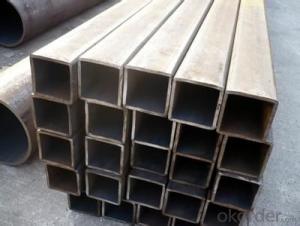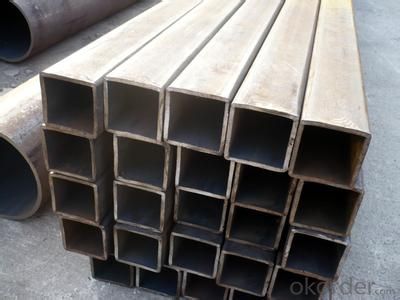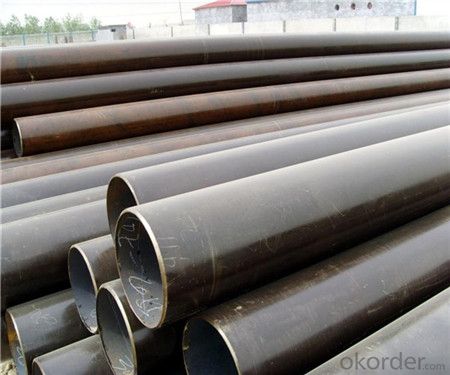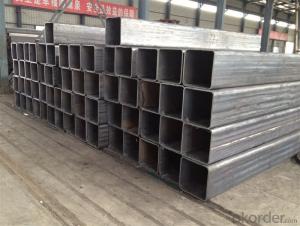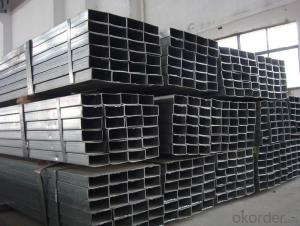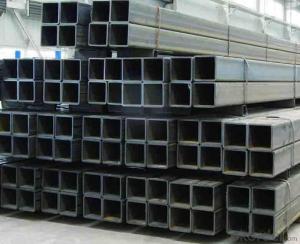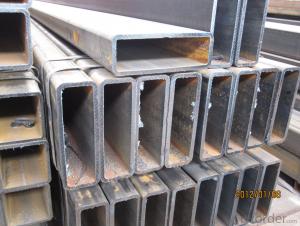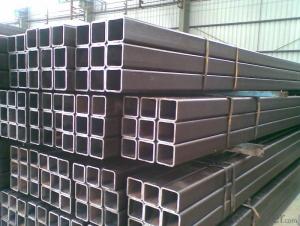ASTM A500 Hollow Section factory
- Loading Port:
- China Main Port
- Payment Terms:
- TT or LC
- Min Order Qty:
- 25 m.t.
- Supply Capability:
- 12000 m.t./month
OKorder Service Pledge
OKorder Financial Service
You Might Also Like
1、Structure of Rectanglar Hollow section:
Rectanglar Hollow section is formed by drawing a solid billet over a piercing rod to create the hollow shell. As the manufacturing process does not include any welding, seamless pipes are perceived to be stronger and more reliable. Historically seamless pipe was regarded as withstanding pressure better than other types, and was often more easily available than welded pipe.
carbon seamless steel pipes are widely used in gas, water and oil, transpotation;constructions;Bridge,highway,windows of model steel door; building materials;fences;heating facilities Fluid Pipe;conduit pipe,scaffolding pipe.etc.
Payment Terms: L/C D/A D/P T/T
Packing and shipment
Packaged in bundles,as per customers' requirements, it can also bepackagesd as beveled ends, typed marking, black painting, plastic caps protection,woven bags packing
For 20" container the max length is 5.8m; For 40" container the max length is 12m. other options are available based on customer requests. Please discuss when placing orders.
Rectanglar Hollow section
1) Dimensions: 10 x 10mm - 400 x 400mm
2) Thickness: 0.45 - 16MM
3) Material:Q235,Q345 S355
2、Main Features of the Seamless Pipe ASTM A106/53:
• High manufacturing accuracy
• High strength
• Small inertia resistance
• Strong heat dissipation ability
• Good visual effect
• Reasonable price
3、Seamless Pipe ASTM A106/53 Specification:
Standard | GB, DIN, ASTM ASTM A106-2006, ASTM A53-2007 |
Grade | 10#-45#, 16Mn 10#, 20#, 45#, 16Mn |
Thickness | 8 - 33 mm |
Section Shape | Round |
Outer Diameter | 133 - 219 mm |
Place of Origin | Shandong, China (Mainland) |
Secondary Or Not | Non-secondary |
Application | Hydraulic Pipe |
Technique | Cold Drawn |
Certification | API |
Surface Treatment | factory state or painted black |
Special Pipe | API Pipe |
Alloy Or Not | Non-alloy |
Length | 5-12M |
Outer Diameter | 21.3-610mm |
Grade | 20#, 45#, Q345, API J55, API K55, API L80, API N80, API P110, A53B |
Standard | ASME, ASTM |
4、Packaging & Delivery
Packaging Details: | seaworthy package,bundles wrapped with strong steel strip |
Delivery Detail: | 15-30days after received 30%TT |
5、FAQ of Seamless Pipe ASTM A106/53:
①How is the quality of your products?
Our products are manufactured strictly according to national and internaional standard, and we take a test
on every pipe before delivered out. If you want see our quality certifications and all kinds of testing report, please just ask us for it.
Guaranteed: If products’ quality don’t accord to discription as we give or the promise before you place order, we promise 100% refund.
②How about price?
Yes, we are factory and be able to give you lowest price below market one, and we have a policy that “ for saving time and absolutely honest business attitude, we quote as lowest as possible for any customer, and discount can be given according to quantity”,if you like bargain and factory price is not low enough as you think, just don’t waste your time.Please trust the quotation we would give you, it is professional one.
③Why should you chose us?
Chose happens because of quality, then price, We can give you both.Additionally, we can also offer professional products inquiry, products knowledge train(for agents), smooth goods delivery, exellent customer solution proposals.Our service formula: good quality+good price+good service=customer’s trust
SGS test is available, customer inspection before shipping is welcome, third party inspection is no problem.
6、Seamless Pipe ASTM A106/53 Images:
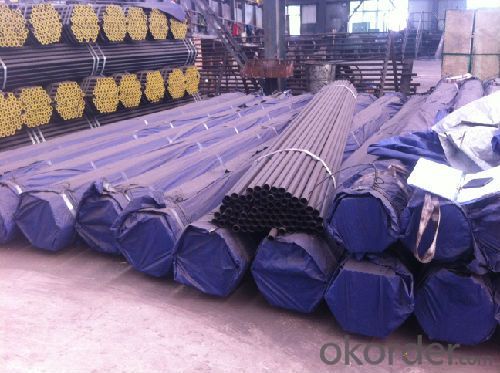
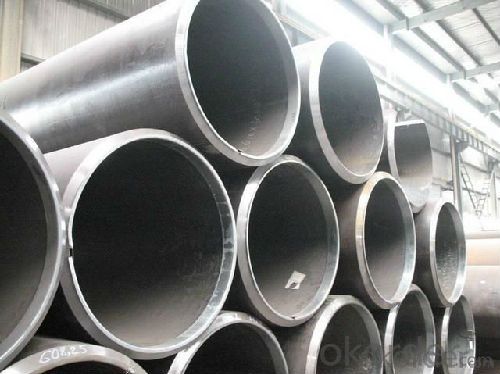
- Q: Are steel pipes suitable for underground mining operations?
- Yes, steel pipes are suitable for underground mining operations. Steel pipes are known for their durability, strength, and resistance to corrosion, making them ideal for use in harsh underground mining environments. They can withstand high pressure and are capable of transporting various substances, such as water, air, or mining materials, with reliability and efficiency. Additionally, steel pipes can be customized to meet specific mining requirements, ensuring their suitability for underground operations.
- Q: What are the different coatings used on steel pipes?
- There are several different coatings used on steel pipes, including epoxy coatings, polyethylene coatings, zinc coatings, and fusion bonded epoxy coatings. These coatings are applied to protect the steel pipes from corrosion and extend their lifespan.
- Q: How to identify stainless steel pipe and steel pipe?
- The welded pipe is rolled into the steel tubular to sew or spiral seam welded in the manufacturing method, and is divided into low pressure fluid delivery with welded steel pipe, spiral welded steel pipe, welded steel pipe, welded pipe roll etc.. Seamless steel pipe can be used in various industries, such as liquid, pneumatic, pipeline and gas pipeline. Welding pipes can be used in water pipelines, gas pipelines, heating pipes, electrical appliances, pipelines and so on.
- Q: Can steel pipes be used for roller coaster tracks?
- Yes, steel pipes can be used for roller coaster tracks. Steel is a commonly used material for roller coaster tracks due to its strength, durability, and ability to withstand intense forces and high speeds.
- Q: How are steel pipes graded?
- Steel pipes are graded based on various factors such as the composition of steel, manufacturing process, and physical properties like strength, durability, and corrosion resistance. These grades are assigned based on internationally recognized standards such as ASTM, API, and ISO, which provide specific criteria for different applications and industries.
- Q: Can steel pipes be used for conveying compressed air?
- Indeed, compressed air can indeed be conveyed through steel pipes. In industrial settings, steel pipes find frequent use due to their ability to withstand high pressure and maintain durability. With their remarkable tensile strength, steel pipes prove capable of handling the immense pressures generated by compressed air systems. Furthermore, the resistance of steel pipes to corrosion becomes crucial when confronted with moisture within compressed air. Nevertheless, it remains vital to guarantee that the steel pipes are adequately sized and rated to meet the precise pressure and flow prerequisites of the compressed air system. Moreover, adhering to proper installation and maintenance practices becomes imperative to avert any potential leaks or failures.
- Q: How do you calculate the deflection of a steel pipe?
- To determine the deflection of a steel pipe, one must take into account various factors, including material properties, applied loads, and geometrical characteristics. The following steps can serve as a guide: 1. Material properties must be determined. This involves obtaining information about the steel pipe, such as its Young's modulus (E), which signifies its stiffness or resistance to deformation. Typically, this value is provided by the manufacturer or can be found in material databases. 2. The applied loads need to be analyzed. It is necessary to identify the types and magnitudes of the loads acting on the steel pipe. These loads can consist of point loads, distributed loads, or a combination of both. Additionally, the location and orientation of the applied loads must be determined. 3. The geometry of the pipe must be evaluated. The dimensions of the steel pipe, including its length (L), outer diameter (D), and wall thickness (t), should be measured or obtained. Accuracy in these values is crucial for precise calculations. 4. An appropriate calculation method should be selected. Depending on the complexity of the loading and support conditions, one may need to employ either simple beam theory or more advanced structural analysis methods, such as the finite element method (FEM). 5. The relevant equations must be applied. For simple beam theory, the Euler-Bernoulli beam equation can be utilized to calculate the deflection at a specific point on the pipe. This equation assumes the pipe is homogeneous, linearly elastic, and subjected to small deflections. In more complex scenarios, FEM software can handle the calculations. 6. Boundary conditions must be determined. The support conditions at both ends of the pipe, which can include fixed supports, simply supported ends, or combinations of both, need to be identified. These conditions significantly influence the deflection of the pipe. 7. The deflection can be calculated. By using the equations relevant to the chosen method and incorporating the material properties, applied loads, and geometry, one can calculate the deflection at specific points along the steel pipe. The deflection can be measured in terms of vertical displacement or angular rotation. It is important to note that calculating the deflection of a steel pipe may require specialized engineering knowledge and software tools. If one lacks experience in structural analysis, it is advisable to consult a professional engineer to ensure accurate results and safe design.
- Q: Difference and application of seamless hot rolled pipe and cold drawn pipe in seamless steel tube
- type3.1, seamless steel pipe according to the different production methods can be divided into hot-rolled pipe, cold rolled tube, cold drawn tube, extrusion tube and so on3.2, according to the shape of the classification of circular tubes, special-shaped tubes of the division, except the square tube and rectangular tube, there are elliptical tube, semicircle tube, triangle tube, hexagonal tube, convex shaped tube, plum shaped tube and so on3.3, according to the different material, divided into ordinary carbon structure tube, low alloy structure tube, high quality carbon structure tube, alloy structure tube, stainless steel tube and so on3.4, according to special use, there are boiler tubes, geological pipes, oil pipes and so on
- Q: How do you remove rust from steel pipes?
- There exist several methods to eliminate rust from steel pipes: 1. Employ a wire brush or steel wool: Initiate the process by vigorously scrubbing the rusted areas with either a wire brush or steel wool. This action will effectively detach loose rust and flakes from the pipe's surface. 2. Administer vinegar or lemon juice: Immerse a cloth or sponge in white vinegar or lemon juice and generously apply it onto the rusted sections. Allow it to remain undisturbed for several hours or, preferably, overnight. The acidic properties of these substances facilitate the dissolution of the rust. 3. Utilize a rust remover or converter: Numerous rust remover products are readily available on the market. Adhere to the product's instructions and apply it to the affected regions. Typically, these solutions transform rust into a water-soluble compound that can be effortlessly rinsed away. 4. Employ a paste comprising baking soda and water: Combine baking soda with water, creating a thick paste. Apply this paste onto the rusted areas and allow it to sit for a few hours. Proceed to scrub the region using a brush or steel wool before rinsing it off. 5. Experiment with a commercially manufactured rust dissolver: Should the aforementioned approaches fail to yield satisfactory results, it may be worth considering the use of a commercial rust dissolver. These products are specifically designed to eradicate rust from various surfaces, including steel pipes. Comply with the manufacturer's instructions accordingly. Kindly remember to equip yourself with protective gloves, goggles, and a mask when handling rust removal products, as they possess corrosive properties and may release toxic fumes. Furthermore, it is advisable to apply a rust-inhibiting primer or paint subsequent to rust removal to prevent future instances of rusting.
- Q: How are steel pipes used in the construction of power plants?
- Steel pipes are used in the construction of power plants to transport various fluids, such as water, steam, and fuel, throughout the facility. They are essential for ensuring a reliable and efficient flow of these substances, which are crucial for the operation of power generation equipment. Additionally, steel pipes are also used for structural support and to create ventilation and exhaust systems within the power plant.
Send your message to us
ASTM A500 Hollow Section factory
- Loading Port:
- China Main Port
- Payment Terms:
- TT or LC
- Min Order Qty:
- 25 m.t.
- Supply Capability:
- 12000 m.t./month
OKorder Service Pledge
OKorder Financial Service
Similar products
Hot products
Hot Searches
Related keywords
